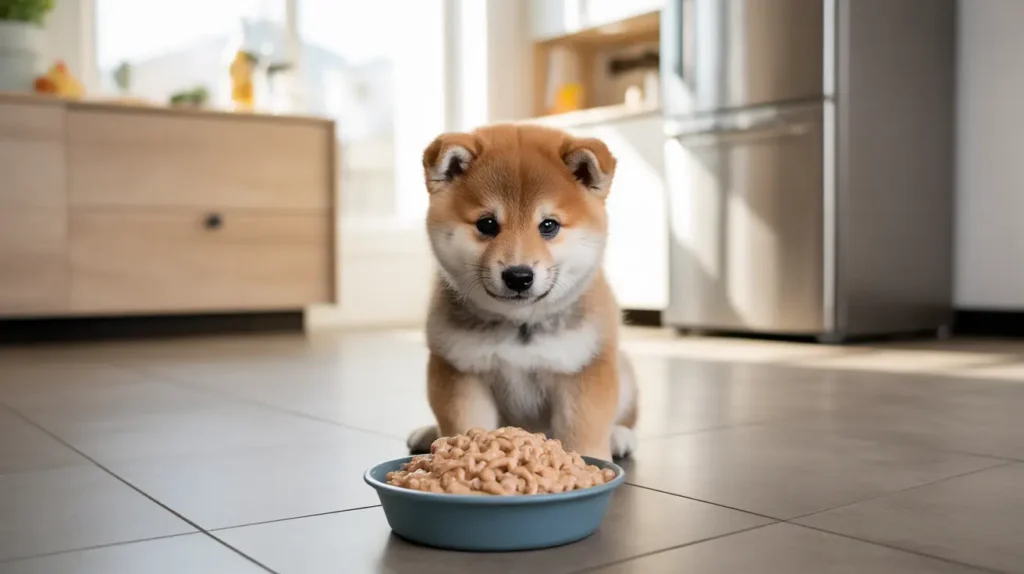Diarrhea in puppies is one of the most common health problems that dog owners face. If your puppy is having diarrhea, it can be worrying and messy — but understanding why it’s happening is the first step to helping them recover. Puppies have sensitive digestive systems, and even small changes in diet, stress, or environment can upset their stomachs. Knowing the possible causes, treatments, and prevention tips can make a big difference in keeping your little friend healthy and happy.
Understanding Puppy Diarrhea
Diarrhea refers to the frequent passing of loose, watery, or unformed stools. It’s not a disease by itself but rather a symptom of an underlying issue. In puppies, diarrhea can occur suddenly (acute) or persist for days to weeks (chronic).
Common Signs of Puppy Diarrhea
- Watery or mushy stools
- Increased frequency of bowel movements
- Straining or urgency when pooping
- Mucus or blood in stool
- Lethargy or weakness
- Loss of appetite
- Dehydration (dry nose, sticky gums, sunken eyes)
If your puppy is acting normally, eating, and drinking water, mild diarrhea may resolve on its own. However, if symptoms persist for more than 24 hours or worsen, veterinary care is necessary.
Causes of Diarrhea in Puppies
There are numerous reasons why puppies develop diarrhea. Understanding these can help you narrow down what’s going on and respond appropriately.
1. Dietary Indiscretion
Puppies love to explore with their mouths. Eating garbage, grass, spoiled food, or non-food items (like socks or toys) can upset their stomach and lead to diarrhea. This is often referred to as “garbage gut.”
2. Sudden Diet Changes
Switching your puppy’s food abruptly can disrupt the balance of gut bacteria. Always introduce new foods gradually over 7–10 days to avoid digestive upset.
3. Food Intolerance or Allergies
Some puppies are sensitive to certain ingredients, such as chicken, beef, wheat, or dairy. If diarrhea recurs after eating specific foods, a food sensitivity might be to blame.
4. Intestinal Parasites
Roundworms, hookworms, Giardia, and coccidia are common culprits. Puppies often pick them up from contaminated soil, water, or their mother’s milk. Parasite infections are a leading cause of persistent diarrhea in young dogs.
5. Infections
Viral and bacterial infections can cause severe, sometimes life-threatening diarrhea in puppies.
Common examples include:
Common examples include:
- Parvovirus (Parvo) – bloody diarrhea, vomiting, and dehydration. Highly contagious.
- Distemper – affects the respiratory and digestive systems.
- Coronavirus – mild to moderate diarrhea and lethargy.
- Salmonella and E. coli – bacterial causes from contaminated food or water.
6. Stress (Stress-Induced Diarrhea)
Moving to a new home, traveling, or exposure to new pets can cause “stress colitis.” This condition often causes soft stools for a few days but typically resolves once the puppy adjusts.
7. Medication Side Effects
Certain antibiotics, dewormers, or anti-inflammatory drugs may disturb gut flora, leading to temporary diarrhea.
8. Underlying Medical Conditions
Chronic diarrhea might indicate more serious health problems, such as:
- Inflammatory bowel disease (IBD)
- Pancreatic insufficiency
- Liver or kidney issues
- Genetic or immune system disorders
When to Worry: Warning Signs That Require a Vet
While mild diarrhea can pass on its own, some cases require urgent veterinary attention. Call your vet if you notice:
- Blood or black tar-like stool
- Severe vomiting with diarrhea
- Refusal to eat or drink
- Fever, weakness, or collapse
- Diarrhea lasting more than 48 hours
- Signs of dehydration
- A very young puppy (under 12 weeks) with diarrhea
💡 Tip: Young puppies dehydrate quickly. Even mild diarrhea can become an emergency if not addressed promptly.
Diagnosing the Cause
Your veterinarian will perform several diagnostic tests to find the cause of your puppy’s diarrhea, such as:
- Fecal Examination: Checks for parasites and bacterial infections.
- Blood Tests: Assesses organ function and detects systemic infections.
- Parvo Test: Essential for Unvaccinated or Sick Puppies.
- X-rays or Ultrasound: If a foreign object or blockage is suspected.
- Dietary Elimination Trials: Used to identify food allergies or intolerances.
Treating Puppy Diarrhea at Home (For Mild Cases)
If your puppy is active, drinking, and not vomiting, you may start with simple home care. Here’s how to help:
1. Fasting Period (6–12 Hours)
Give your puppy’s stomach time to rest by withholding food for up to 12 hours. Continue to offer fresh water or an electrolyte solution to prevent dehydration.
2. Hydration Is Critical
Encourage small, frequent sips of water. You can also use unflavored Pedialyte or a vet-approved electrolyte solution.
If your puppy refuses to drink, see a vet immediately for IV fluids.
3. Bland Diet
After the fasting period, reintroduce food slowly. Start with:
- Boiled chicken (no skin or seasoning)
- Plain white rice or pumpkin puree
- Boiled ground turkey
Feed small portions three to four times a day.
Continue the bland diet for 2–3 days, then gradually mix in your puppy’s regular food over several days.
4. Probiotics
Probiotics can help restore healthy gut bacteria. Look for vet-approved brands designed for puppies. They can reduce the duration and severity of diarrhea.
5. Avoid Over-the-Counter Medications
Human anti-diarrheal drugs (like Imodium) can be dangerous to puppies. Never give medication without your vet’s approval.
Veterinary Treatment for Severe Diarrhea
If your puppy’s diarrhea is caused by an infection, parasites, or other medical conditions, your vet may prescribe:
- Dewormers: To eliminate intestinal parasites.
- Antibiotics: For bacterial infections.
- Antivirals: In rare cases for viral infections.
- Fluid Therapy: IV or subcutaneous fluids to prevent dehydration.
- Anti-nausea and anti-diarrheal medications: To reduce vomiting and discomfort.
- Prescription diets: Specially formulated for sensitive digestion.
Hospitalization may be required in severe cases, such as Parvo infection, to provide round-the-clock care.
How to Prevent Puppy Diarrhea
Prevention is always better than a cure. Follow these simple steps to reduce your puppy’s risk of diarrhea.
1. Stick to a Consistent Diet
Avoid frequent food changes and refrain from feeding table scraps. Choose a high-quality puppy formula suited to your dog’s breed and age.
2. Provide Clean Water
Always ensure your puppy has access to clean, fresh water. Avoid letting them drink from puddles or lakes.
3. Regular Deworming and Vaccination
Follow your vet’s deworming and vaccination schedule to protect against common parasites and viruses.
4. Puppy-Proof Your Home
Keep trash bins closed and remove small or toxic items that could be ingested by puppies.
5. Introduce New Foods Gradually
If you’re switching foods, mix small portions of the new food with the old one, increasing gradually over a week.
6. Minimize Stress
Allow your puppy time to adjust to new surroundings and maintain a consistent routine for feeding, play, and rest.
7. Practice Good Hygiene
Wash food and water bowls daily, clean up feces promptly, and maintain a clean living environment.
Natural Remedies (With Caution)
Some natural approaches can help soothe mild stomach upset; however, always consult your veterinarian before trying them.
- Pumpkin Puree: High in fiber, helps regulate bowel movements.
- Slippery Elm Bark: Soothes intestinal inflammation.
- Bone Broth: Hydrating and easy to digest.
- Plain Yogurt (for older puppies): Provides probiotics, but only in small amounts.
Avoid herbs or supplements unless approved by a veterinarian.
Recovery Timeline
The recovery time depends on the cause:
- Mild dietary diarrhea: 1–3 days
- Parasitic infections: 1–2 weeks (with treatment)
- Viral infections (like Parvo): 2–3 weeks (requires vet care)
During recovery:
- Keep your puppy warm and hydrated.
- Feed small, frequent meals.
- Monitor stool consistency daily.
- Gradually return to regular food.
Long-Term Management for Sensitive Puppies
Some puppies have sensitive stomachs and may need ongoing dietary management.
Recommended Long-Term Steps:
- Feed a limited-ingredient or hypoallergenic diet.
- Add probiotics regularly to maintain gut balance.
- Schedule routine vet checkups every 6 months.
- Keep a journal of foods, treats, and stool quality.
If diarrhea recurs frequently, your vet may refer you to a veterinary gastroenterologist for deeper testing.
Myths About Puppy Diarrhea
Let’s clear up a few common misconceptions:
| Myth | Truth |
|---|---|
| “It’s normal for puppies to have diarrhea.” | Not true — persistent diarrhea is a warning sign. |
| “You can give human medicine like Imodium.” | Dangerous! Only use vet-prescribed meds. |
| “Puppy diarrhea always means Parvo.” | Not always. Many mild causes exist, but Parvo must be ruled out. |
| “Milk helps soothe an upset stomach.” | False — many puppies are lactose intolerant. |
Key Takeaways
- Diarrhea is a symptom, not a disease.
- Mild cases may resolve with rest, hydration, and bland food.
- Persistent or bloody diarrhea requires immediate veterinary attention.
- Prevent issues by maintaining a proper diet, deworming, and vaccination.
- Early intervention can save your puppy’s life.
Final Thoughts
A puppy’s digestive system is delicate, and diarrhea can quickly become serious if ignored. Always monitor your puppy’s behavior, appetite, and stool.
Even if it seems like a simple upset stomach, persistent or severe diarrhea can lead to dehydration and other complications in just a short time.
Being a responsible pet parent means acting promptly, remaining calm, and seeking veterinary care when necessary. With the right care and attention, your furry friend will bounce back to their playful self in no time.

